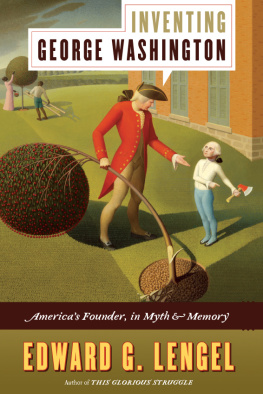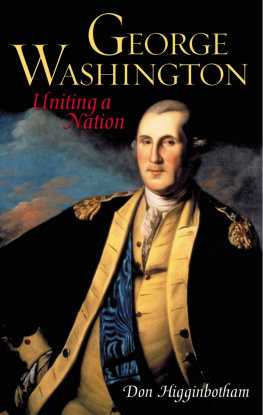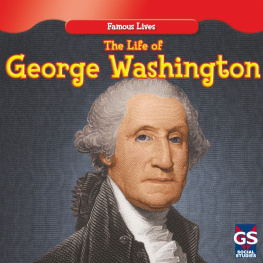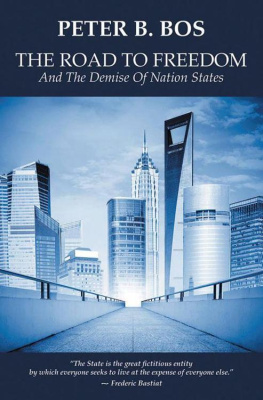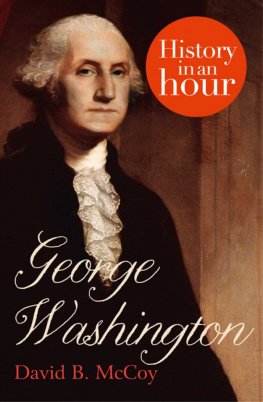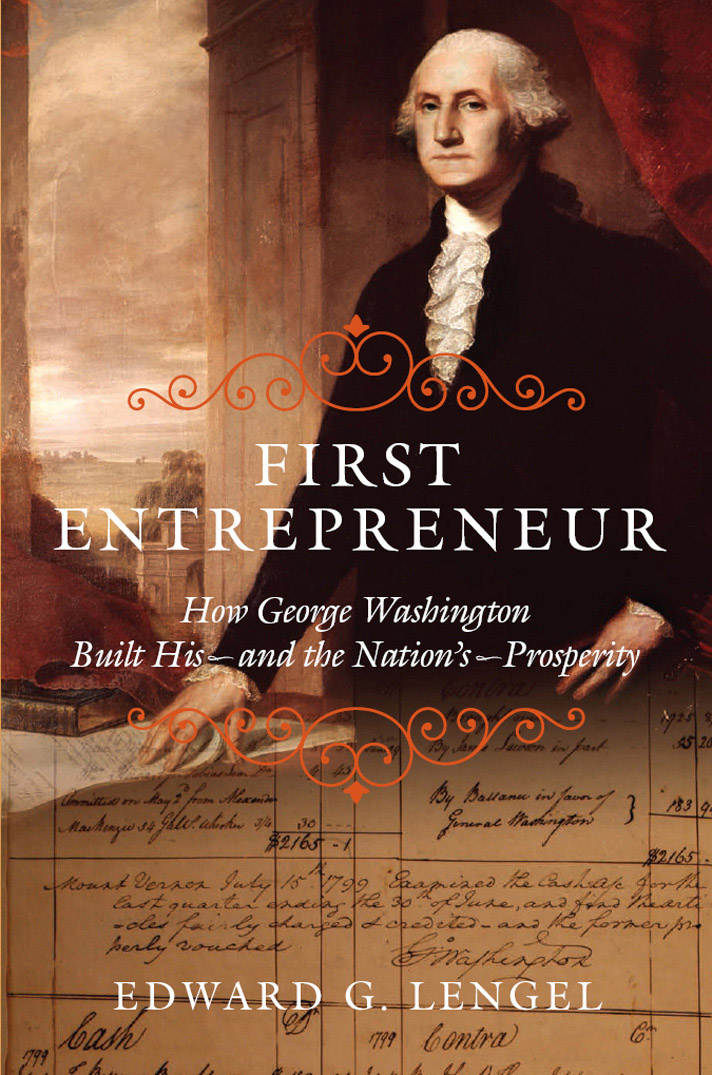

Copyright 2016 by Edward G. Lengel
All rights reserved. No part of this publication may be reproduced, stored in a retrieval system, or transmitted, in any form or by any means, electronic, mechanical, photocopying, recording, or otherwise, without the prior written permission of the publisher. Printed in the United States of America. For information, address Da Capo Press, 44 Farnsworth Street, Third Floor, Boston, MA 02210.
Designed by Pauline Brown
Set in 11.5 point Adobe Garamond Pro by The Perseus Books Group
Library of Congress Cataloging-in-Publication Data
Lengel, Edward G., author.
First entrepreneur: how George Washington built hisand the nationsprosperity / Edward G. Lengel.
pages cm
Includes bibliographical references and index.
ISBN 978-0-306-82348-0 (e-book) 1. Washington, George, 17321799Career in business. 2. PresidentsUnited StatesBiography. 3. Mount Vernon (Va.: Estate) I. Title.
E312.17.L46 2015
973.4'1092dc23
2015032444
Published by Da Capo Press
A Member of the Perseus Books Group
www.dacapopress.com
Da Capo Press books are available at special discounts for bulk purchases in the US by corporations, institutions, and other organizations. For more information, please contact the Special Markets Department at the Perseus Books Group, 2300 Chestnut Street, Suite 200, Philadelphia, PA 19103, or call (800) 810-4145, ext. 5000, or e-mail .
10 9 8 7 6 5 4 3 2 1
Table of Contents
Guide
CONTENTS
MAPS
Modern documentary editors pride themselves, and rightly so, on their scrupulous fidelity to the original source text. At the Washington Papers project at the University of Virginia, where I have worked since 1997, editors prepare transcriptions that faithfully reproduce George Washingtons writing with all of its misspellings, abbreviations, contractions, and infelicities of grammar and style. Though he was an intelligent and well-read man, in the liberal arts Washington was largely self-taught rather than formally educatedand this is apparent in his letters (especially those he wrote early in life). His writings also reflected the generally loose and inconsistent nature of eighteenth-century orthography.
Unfortunately, scrupulously literal transcriptions can sometimes appear inscrutable to twenty-first-century eyes and minds. It is enough to interpret eighteenth-century styles of writing and speech without having to wade through inadvertent errors, abbreviations, contractions, and other impediments to understanding. For that reason, in rendering letters to and from Washington I have taken the liberty of silently correcting minor spelling errors and expanding abbreviations and contractions in order to enhance readability.
CURRENCY
Colonial and early-American currency can be bewildering. Colonial governments sought to and often did issue paper currencies in bids to stabilize commerce, but the British imposition of Currency Acts in 1751 and 1764 undermined their ability to do so. As a result, Americans often had to rely on commodity exchange notes, such as tobacco notes, and hard money minted abroad, such as Spanish silver dollars. For their part, British merchants paid American farmers not in cash but in credit.
Increasing the confusion was the fact that colonial governments typically issued their currencies in British denominations, a practice some states continued during the war and in the Confederation period; consequently, in references to pounds, shillings, and pence the distinction between colonial and state currencies or pounds sterling is often unclear. After the war began and before the adoption of the Constitution, the United States was awash in paper and hard currencies (the latter frequently cut into bills) of all imaginable varieties alongside the new but much-battered dollar. Contemporaries struggled to understand the worth of the different currencies, and so commerce typically degenerated into barter or the exchange of commodities in kind. Even after the Constitution was established with a single national currency, that currency remained unstable for some time and other forms of hard and paper currency did not immediately fall out of circulation.
The confusion is to some degree reflected in this book. Symbols for pounds and dollars appear interchangeably because Washington, like his countrymen, used these and other currencies at different times of his life. In this book, references to pounds almost always refer to Virginia currency rather than to pounds sterling, while dollars are Continental and then (after the Constitution) American dollars. Other currencies, though, sometimes appear as well.
GEORGE WASHINGTON PROBABLY WROTE THOUSANDS OF safe-passage passes, as was only natural for a man who held so much authority. Most of them were routine: allowing civilians to cross military checkpoints, messengers to enter secured areas, and the like. There were exceptionslike passes for spies. None, though, was more unusual than the one he penned at his presidential desk in Philadelphia on the morning of January 9, 1793. It read:
The bearer hereof, Mr. Blanchard a citizen of France, proposing to ascend in a balloon from the city of Philadelphia, at 10 oclock, A.M. this day, to pass in such direction and to descend in such place as circumstances may render most convenientTHESE are therefore to recommend to all citizens of the United States, and others, that in his passage, descent, return or journeying elsewhere, they oppose no hindrance or molestation to the said Mr. Blanchard; And, that on the contrary, they receive and aid him with that humanity and good will, which may render honor to their country, and justice to an individual so distinguished by his efforts to establish and advance an art, in order to make it useful to mankind in general.
Washington would deliver this pass personally.
Cannon fire awoke Philadelphians at dawn that day. The gunsunloaded, thankfullyboomed at regular intervals thereafter, and a growing hubbub embroiled the streets. Curious crowds gravitated toward the prison yard, where people jabbered excitedly about a big event due to begin at nine oclock. Many probably thought they were about to witness a hanging until they caught glimpses of an immense heap of yellow varnished silk laced with netting lying in the yards center. A Frenchman gaily dressed in a blue suit and cocked hat bedecked with white feathers strutted around the heap, looking important. Incredibly, the heap began to expand slowly as an orchestra played a slow, solemn accompaniment. Soon an immense concourse of spectators had assembled to view the majestic sight, which they found truly awful and interesting. Discovering that the heap of cloth was in fact a balloon, and that they were about to witness it in flight, the crowd broke into frenzied applause. Some noticed men hawking ticketsfive dollars to enter the prison yard and witness the spectacle up close. This crowd, though, possessed a sort of collective intelligence. Reasoning that once the balloon ascended it would be just as visible from outside the yard as it was inside, spectators spurned the ticket-sellers and scrambled onto window-ledges, shimmied up posts, and stampeded into nearby vacant lots.
At ten oclock another finely dressed and solemn figure entered the yardthe President of the United States. Washington handed his pass to the bold RONAUT and spoke a few words into his ear. After a simple bow, the Frenchman vaulted with amazing agility into his blue and spangled boat under the now fully inflated balloon. While the president watched, he dumped some ballast and the craft slowly began to rise. Blanchard furiously waved flags of the United States and France, and then waved his hat to the thousands of [mostly freeloading] citizens from every part of the country who stood gratified and astonished at his intrepidity. The wind swept up within a few minutes, propelling the balloon off to the southeast. Some local gentlemen whipped their steeds after it but fell quickly behind as it disappeared over the treetops.


